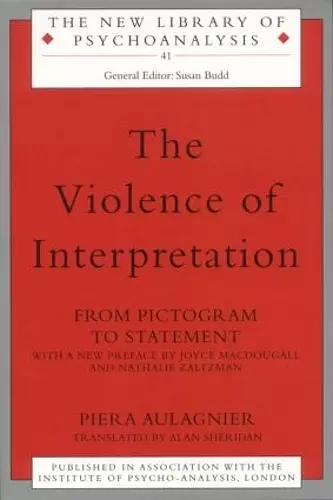The Violence of Interpretation
From Pictogram to Statement
Piera Aulagnier author Alan Sheridan translator
Format:Paperback
Publisher:Taylor & Francis Ltd
Published:8th Mar '01
Currently unavailable, and unfortunately no date known when it will be back

Published in English for the first time, this is a seminal work by an original and creative analytical thinker.
Piera Aulagnier's The Violence of Interpretation bridges the work of Winnicott and Lacan, putting forward a theory of psychosis based on children's early experiences. The author's analysis of the relationship between the other's communications and the infant's psychic experience. and of the pre-verbal stage of development of unconscious fantasy starting from the 'pictogram', have fundamental implications for the psychoanalytic theory of development. She developed Lacan's ideas to enable the treatment of severe psychotic states.
Containing detailed discussion of clinical material, and written in the author's precise yet provocative style, The Violence of Interpretation is a welcome addition to the New Library of Psychoanalysis.
"...the single most important contribution to the psychoanalytic understanding of psychosis published during the last twenty years..."- Otto F. Kernberg, President International Psychoanalytical Association
"Aulagnier's book is considered a masterpiece in the French Psychoanalytic Community."- Dr Francis Baudry
"This book is remarkable for its depth and originality"- André Lussier
'...the single most important contribution to the psychoanalytic understanding of psychosis published during the last twenty years...' - Otto F. Kernberg, President International Psychoanalytical Association
'Aulagnier's book is considered a masterpiece in the French Psychoanalytic Community.' - Dr Francis Baudry
'This book is remarkable for its depth and originality' - André Lussier
'La violence de I'interpretation by Piera Aulagnier has finally been translated into English, twenty-six years after its first publication. This work will be of interest to English-speaking readers for a variety of reasons. First, it bears witness to an essential stage in the career of a deeply individual author, who has enriched contemporary French psychoanalysis by, in particular, shedding new light on the study of psychosis. Secondly, the English-speaking reader, aware of the debates between Melanie Klein and Winnicott, will read with interest the author's elaborations on the origins of psychical life, the weight of reality in the constitution of the psyche of the subject, and the links between this reality and the maternal body and psyche. Thirdly, the central place the author gives to identification and to the 'identificatory project' will catch the reader's eye.' - Helène Troisier, Review in IJPA 83 (1), 2002.
'Aulagnier sees psychic development as balanced between drives, the need for satisfaction, and thought, the need "to make sense". In working with psychotic patients, she found that communications from the mother (or the parents), both in words and in action, had led either to painful answers to essential questions concerning how the child came to have life or to secrets that could not be spoken or thought. The problematic questions in psychosis are questions of origin: Did you desire me? How did I come to be? She describes a pattern in which the mothers of future psychotic patients did not want a child, or did not want this child. The mother imposes on the child, to an excess degree, her own idea of how the child is to behave and think. The child is not just to eat, but to eat "properly"; the child is not to sleep, but to sleep "properly". The child experiences this psychic intrusion as violence ... When analyst and patient, each firmly committed to a tradition of meaning, engage each other, they experience the violence of another’s mind imposing a distorted and alien mode of understanding. This is similar to what the patient experienced in childhood; the analyst experiences the ambiguous "psychotic feel".' - K. McKenzie - Journal of the American Psychoanalytic Association Vol 51 No2, 2003
ISBN: 9780415236768
Dimensions: unknown
Weight: 510g
278 pages